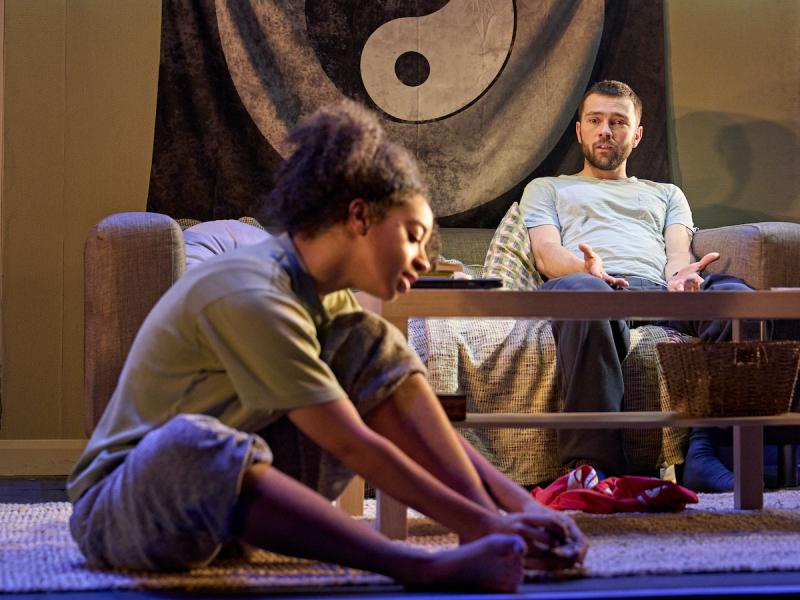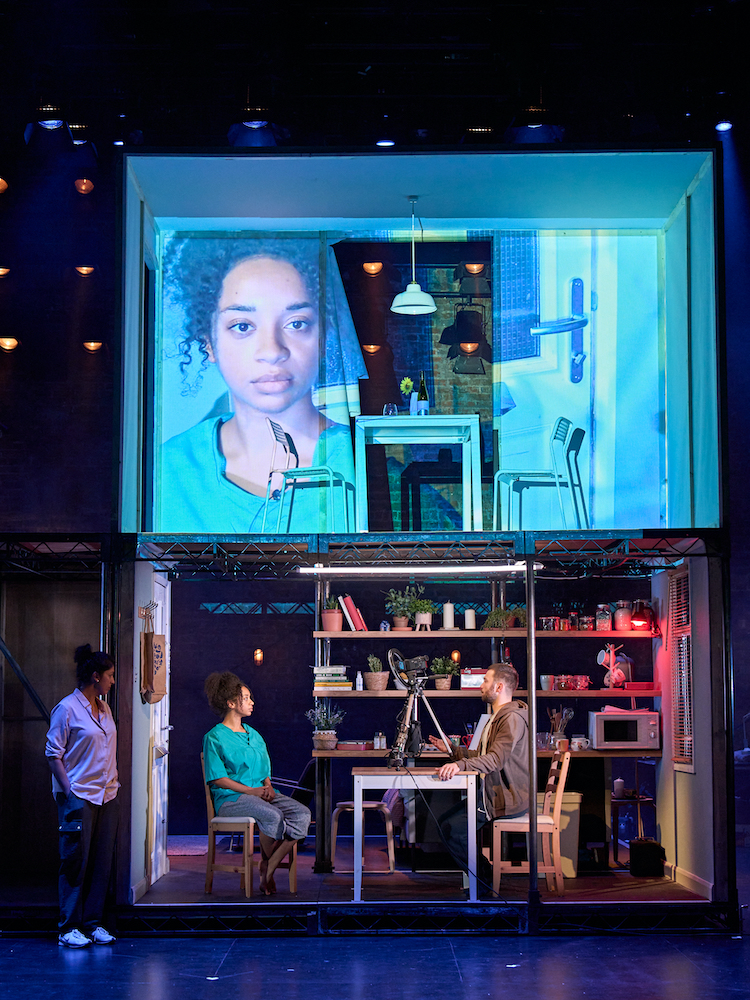That Is Not Who I Am, Royal Court review – gimmicky post-truth spoof | reviews, news & interviews
That Is Not Who I Am, Royal Court review – gimmicky post-truth spoof
That Is Not Who I Am, Royal Court review – gimmicky post-truth spoof
Lucy Kirkwood’s new play is depressingly cynical in form and content

What is the shelf life of a theatre gimmick? In April, the Royal Court announced that they were going to stage a debut play by an unknown writer, Dave Davidson, who has worked for decades in the security industry. His drama was hyped up, helped by Time Out magazine, and by fellow playwrights Simon Stephens and Dennis Kelly.
Hooray! – this new writing venue had discovered an unknown talent. Not. In fact, if you buy a ticket you will not see That Is Not Who I Am by Davidson (who doesn’t exist), but instead you will experience Rapture by Lucy Kirkwood, who is an established playwright. It’s a kind of postmodern, post-truth gimmick. But does it work?
The problem with publicity stunts like this is that, unless the play is a work of genius, the gimmick rapidly becomes tedious and irritating. It spoils the show. Anyway, the evening begins with a spoof public announcement which claims that the Royal Court apologizes for staging Rapture under false pretenses, but has been forced to do so because the Home Secretary has threatened to censor the explosive content of the show: yeah, yeah, pull the other one. And get on with it. Furthermore, the claim that the Royal Court is a heroic unpholder of the right to free speech and is breaking the law by staging Kirkwood’s play is ludicrous and not even smile-worthy.
Lucy Kirkwood, who is played by actor Priyanga Burford, narrates the chilling story of Noah and Celeste, two young people who meet on a blind date organized by a national newspaper, and then live together. Kirkwood shows, quite perceptively, how the psychological needs of two individuals can suddenly click: Noah comes across as weird, but Celeste fancies him; they soon complement each other. They explore the corners of the digital world. But while she works as a nurse, during the stressful COVID pandemic, he is a former soldier who becomes drawn to broadcasting his radical opinions through a home-made film and on his YouTube channel.
 As the Kirkwood character explains, the everyday lives of the couple are recorded by surveillance devices such as their mobile phones, Netflix subscription and by a neighbour, so the play claims to be a factual record of their conversations. A couple of sex scenes, and their difficulty in conceiving a child, suggest an invasion of their privacy, and when the couple decide to organize a political demonstration it is clear that their paranoia about state violence and censorship is well founded. Well, according to Kirkwood, anyway. But, as the title of the play suggests, one alternative to political action is religious enthusiasm – millenarians believe that during the Second Coming the holy ones get an instant rocket to heaven.
As the Kirkwood character explains, the everyday lives of the couple are recorded by surveillance devices such as their mobile phones, Netflix subscription and by a neighbour, so the play claims to be a factual record of their conversations. A couple of sex scenes, and their difficulty in conceiving a child, suggest an invasion of their privacy, and when the couple decide to organize a political demonstration it is clear that their paranoia about state violence and censorship is well founded. Well, according to Kirkwood, anyway. But, as the title of the play suggests, one alternative to political action is religious enthusiasm – millenarians believe that during the Second Coming the holy ones get an instant rocket to heaven.
The satirical content of the play is contemporary, if a bit mild. Conspiracy theories are talked about, the digital world is discussed and the stresses of lockdown acknowledged. A couple of neat ideas pop up: the algorithm, which processes info about Noah and Celeste “in a millionth of a second” led them to fall in love, and the slogan about data being the new oil, and the way we believe our own untruths. With additional material about other contemporary references – from climate change to Mumsnet – Rapture takes 110 minutes to paint a recognizable picture of England today. It’s a mildy amusing comedy of manners trapped in a desperate attempt to be exciting.
Unfortunately, this thriller is never very thrilling, the satire is never very sharp and the humour is lukewarm. Kirkwood’s Noah and Celeste have a more or less convincing couple dynamic, but the overall story is preposterous: they have really done nothing that would justify their termination by the state (Kirkwood gives away their fate right at the start). The characters are fairly close to gender stereotypes (he is nerdish but determined; she is wobbly and then hysterical) and their desire to change the world is treated cynically as one big joke. Only the final moments, when the meta-theatrical frame is smashed, meta-theatrically of course, gives us a jolt of joy.
Lucy Morrison directs this overlong and overblown show with a cool pace on designer Naomi Dawson’s revolving set, which is openly serviced by stage crew and lit up by Gino Ricardo Green’s occasional projections (pictured above). Priyanga Burford’s narration is humane and clear, while Siena Kelly (Celeste) and Jake Davies (Noah) have a notable chemistry and engaging stage presence. But they are in a play that is intricate without being illuminating, and the gimmicks around the show — which include a fake playtext cover — only emphasise its poverty, and its cynical sensibility in which everything, from climate change to political paranoia, is just a joke. Trivial. At a time when many feel a real anger at the current government, this playful silliness feels like a middle-class slap in the face to anyone who really wants to change the world. Still, I’m sure that the Netflix version will be a big hit.
rating
Explore topics
Share this article
The future of Arts Journalism
You can stop theartsdesk.com closing!
We urgently need financing to survive. Our fundraising drive has thus far raised £49,000 but we need to reach £100,000 or we will be forced to close. Please contribute here: https://gofund.me/c3f6033d
And if you can forward this information to anyone who might assist, we’d be grateful.

Subscribe to theartsdesk.com
Thank you for continuing to read our work on theartsdesk.com. For unlimited access to every article in its entirety, including our archive of more than 15,000 pieces, we're asking for £5 per month or £40 per year. We feel it's a very good deal, and hope you do too.
To take a subscription now simply click here.
And if you're looking for that extra gift for a friend or family member, why not treat them to a theartsdesk.com gift subscription?
more Theatre
 Ragdoll, Jermyn Street Theatre review - compelling and emotionally truthful
Katherine Moar returns with a Patty Hearst-inspired follow up to her debut hit 'Farm Hall'
Ragdoll, Jermyn Street Theatre review - compelling and emotionally truthful
Katherine Moar returns with a Patty Hearst-inspired follow up to her debut hit 'Farm Hall'
 Troilus and Cressida, Globe Theatre review - a 'problem play' with added problems
Raucous and carnivalesque, but also ugly and incomprehensible
Troilus and Cressida, Globe Theatre review - a 'problem play' with added problems
Raucous and carnivalesque, but also ugly and incomprehensible
 Clarkston, Trafalgar Theatre review - two lads on a road to nowhere
Netflix star, Joe Locke, is the selling point of a production that needs one
Clarkston, Trafalgar Theatre review - two lads on a road to nowhere
Netflix star, Joe Locke, is the selling point of a production that needs one
 Ghost Stories, Peacock Theatre review - spirited staging but short on scares
Impressive spectacle saves an ageing show in an unsuitable venue
Ghost Stories, Peacock Theatre review - spirited staging but short on scares
Impressive spectacle saves an ageing show in an unsuitable venue
 Hamlet, National Theatre review - turning tragedy to comedy is no joke
Hiran Abeyeskera’s childlike prince falls flat in a mixed production
Hamlet, National Theatre review - turning tragedy to comedy is no joke
Hiran Abeyeskera’s childlike prince falls flat in a mixed production
 Rohtko, Barbican review - postmodern meditation on fake and authentic art is less than the sum of its parts
Łukasz Twarkowski's production dazzles without illuminating
Rohtko, Barbican review - postmodern meditation on fake and authentic art is less than the sum of its parts
Łukasz Twarkowski's production dazzles without illuminating
 Lee, Park Theatre review - Lee Krasner looks back on her life as an artist
Informative and interesting, the play's format limits its potential
Lee, Park Theatre review - Lee Krasner looks back on her life as an artist
Informative and interesting, the play's format limits its potential
 Measure for Measure, RSC, Stratford review - 'problem play' has no problem with relevance
Shakespeare, in this adaptation, is at his most perceptive
Measure for Measure, RSC, Stratford review - 'problem play' has no problem with relevance
Shakespeare, in this adaptation, is at his most perceptive
 The Importance of Being Earnest, Noël Coward Theatre review - dazzling and delightful queer fest
West End transfer of National Theatre hit stars Stephen Fry and Olly Alexander
The Importance of Being Earnest, Noël Coward Theatre review - dazzling and delightful queer fest
West End transfer of National Theatre hit stars Stephen Fry and Olly Alexander
 Get Down Tonight, Charing Cross Theatre review - glitz and hits from the 70s
If you love the songs of KC and the Sunshine Band, Please Do Go!
Get Down Tonight, Charing Cross Theatre review - glitz and hits from the 70s
If you love the songs of KC and the Sunshine Band, Please Do Go!
 Punch, Apollo Theatre review - powerful play about the strength of redemption
James Graham's play transfixes the audience at every stage
Punch, Apollo Theatre review - powerful play about the strength of redemption
James Graham's play transfixes the audience at every stage
 The Billionaire Inside Your Head, Hampstead Theatre review - a map of a man with OCD
Will Lord's promising debut burdens a fine cast with too much dialogue
The Billionaire Inside Your Head, Hampstead Theatre review - a map of a man with OCD
Will Lord's promising debut burdens a fine cast with too much dialogue

Add comment